10 Physical Self Care Tips to Heal Insomnia
Sharing is caring!
If you’ve ever experienced insomnia, you know that it’s the worst. Luckily, I’ve been able to improve mine over the years. And it all starts with taking better physical care of yourself! So, here are 10 physical self care tips to heal insomnia.
10 Physical Self Care Tips to Heal Insomnia

Hey friends! To start off, I want to let you know that this is the first post in my insomnia series! On New Year’s Day, I asked my Instagram followers what they wanted to hear about this month and healing insomnia was the top vote. So, here we go!
While I still have insomnia from time to time, it’s very rare now!
But to give you a little background, I started suffering from insomnia when I was 18. Now I’m 30, and over the last 12 years I’ve learned how to nurture myself and pinpoint what stops me from sleeping.
While there are a lot of causes to my insomnia, the very first thing that helps me is taking care of my physical body. Here are some of the ways I do that.
Self-Care Tips for Insomnia
#1 Go to Bed at the Same Time Each Night
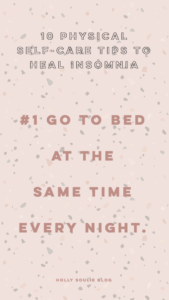
First of all, this one will help so much. While I know it can be difficult to go to bed at a specific time, it really helps.
If you think of kids, they thrive on schedules and bedtimes. And so do adults! So, make sure to set a specific time to go to bed and stick with it.
As for the weekends, I personally stay up a little later on Fridays and Saturdays. But I know sleep experts say that if you have insomnia, even that is a no-no.
Between you and me, you gotta have fun and enjoy your life though, right? So, for me it’s ok to stay up a little later on the weekends, but I wouldn’t pull any all-nighters.
#2 Don’t Eat Within 2 Hours of Bedtime
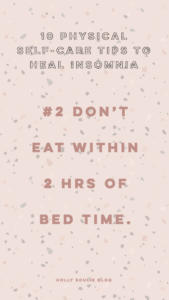
While it’s not good to go to bed starving, it also doesn’t help when I go to bed on a full stomach either.
Personally, I eat dinner around 6-7:00 p.m., then go to bed around 11. But I’ll usually have some popcorn or a little chocolate while I watch TV in the evenings with my husband.
However, I do make sure that I give myself at least two hours before bed where I allow my digestion to slow down and let my body start resting.
#3 Track Your Dinners
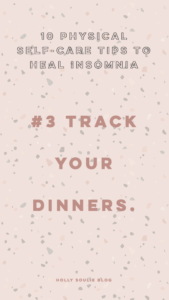
Next, if I’m having an insomnia spell, I’ll think about what I’ve been eating for dinner. Since the food you process in your gut actually affects your brain, it’s good to pay attention to things that keep you from sleeping.
Personally, I’ve pinpointed a few things that are big no-goes for me at dinner. For instance, if I eat a lot of sugar after dinner, that usually affects my sleep.
Or if my dinner has been unbalanced then my tummy doesn’t like that. By unbalanced I mean, too much meat and not enough veggies.
Also, I’ve found I have great sleep when I eat vegetarian meals for dinner. But I love meat, so this isn’t something I’m super focused on.
A final note about this. If you’re eating healthy throughout the day, your body will be happier. So, while dinner has the biggest effect on my sleep, I also try to eat healthy food around the clock.
#4 No Caffeine After Lunch
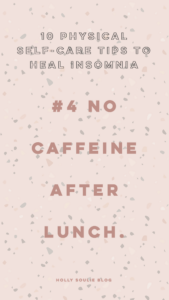
While I know it can be tempting to have a coffee in the afternoon to keep you awake, try to refrain.
As a highly sensitive person, even a black tea at 4 p.m. is enough to upset my sleep.
Since caffeine stays in your system for 12 hours, having an afternoon coffee is sending a message to your body to stay awake for a long time. And we don’t want that!
Another thing about too much caffeine is that it can make you stressed. As someone with anxiety, I have to limit my total daily caffeine intake to 2 cups of coffee in the morning. (Which is so sad because I adore coffee with all my soul!).
If you’re looking for a nice, non-caffeine alternative, here’s a chocolate drink I love for the afternoons!
So, if you’ve having trouble sleeping, consider having less caffeine, and only drinking it in the morning.
#5 No Screens Before Bed
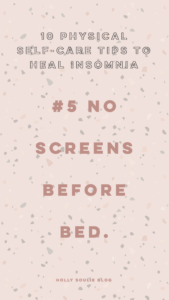
Another thing that really affects my sleep is screen time.
If you haven’t heard about blue light, our screens emit too much blue light in the evening, which prevents sleep. Then the brain gets the message to stay awake and it doesn’t produce enough melatonin to help you fall asleep.
Luckily, a lot of phones and computers have a nighttime mode. And I actually just leave mine on all the time, even during the day. Since I work from home on my computer all day, I find the constant blue light just too harsh.
But beyond looking at a screen, it’s also what you’re doing on your phone or computer. If you’re scrolling through Instagram or working late at night, you’re telling your brain to stay up.
Since we all need quality rest in our over-stimulated world, try to limit your screen time. Especially at least an hour before bed to allow your brain to start relaxing.
#6 Get Organized
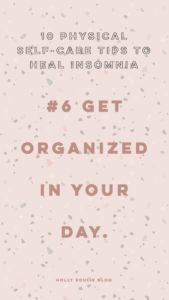
The next thing to think about is being organized with your day. Looking back, some of the times my insomnia was the worst was when I was disorganized.
I’m going to be very honest with you. Time management is NOT one of my strengths. If I could have a random schedule every day, I would. But it makes me too stressed because then I never know when I’ll be able to do everything I want to accomplish.
I’m currently trying time-blocking and I’m finding it a nice way to organize my day so far!
If you have the same issue, start by making a to-do list. When you write down everything you need to do, it helps clear your mind.
After that, rank the things on your list in order of priority. Then, write when you plan to do each thing. Oh, but then, you actually have to do them!
Also, I wouldn’t make this list right before bedtime. I would actually do it in the morning, or once you get to work. I know when I’ve done this right before I go to bed, it turns my brain on again and I can’t sleep.
So, get organized during your day, and your brain will have an easier time resting at night.
#7 Look Back at the Goodness
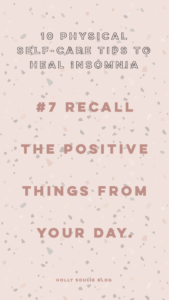
Along with insomnia, I also get very anxious. And you know what else? I can also be a perfectionist and super hard on myself.
This can translate into obsessing about problems. All day. And all night.
One thing I learned is to look back at my day and reflect on what went well while I’m settling into bed. Then I’ll choose 5 things that went well and write them down in my journal.
Actually, it helps to physically write them rather than just thinking them. This helps your brain process the good things that happened in your day. Then if I’m having a hard day, I can open my journal and see some of the small but great things that have happened to me.
Also, when I do this, I can usually come up with way more than just 5 things, which is pretty cool.
So, if you’re anxious or having trouble sleeping, try reflecting on the good things that happened to you during the day.
#8 Use Sleeping Aids Wisely
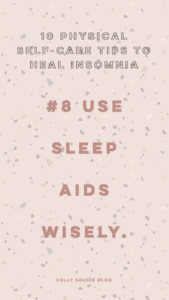
Another thing to consider is using sleeping remedies wisely.
Personally, I have a prescription for a sleeping pill that I take every once in a while. But I’ve had multiple medical professionals tell me not to take them every night. Because if you do, your body forgets how to put itself to sleep.
On the other hand, there are A LOT of natural sleep remedies I’ve taken. Here are a few: melatonin, valerian root, magnesium, flower essences for sleep, GABA and others.
One trick that works for me is to rotate the remedy I use so my body doesn’t get used to it.
So, regardless of if I’m taking a sleeping pill or a natural remedy, I make sure I don’t take something every single night. That way, my body doesn’t get used to relying on them to sleep.
#9 For Women, Pay Attention to Your Cycle
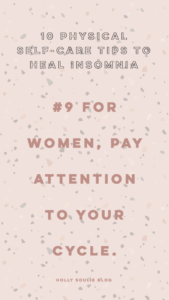
If you’re a dude, this won’t help you lol.
But as a woman, I’ve noticed that I usually have a harder time sleeping when I’m on my period.
So, when that happens, I try to be extra gentle with myself during that time of month. For example, I’ll take more baths, drink red raspberry leaf tea every day, go to bed early and try to rest.
You might not have insomnia during your period but try to pay attention to see if you have a certain time of month where it’s extra difficult to sleep. Then you can try and take care of yourself more during that time.
#10 Try Not to Stress About it All
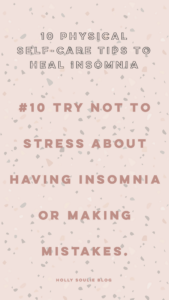
Finally, it can be very stressful to have insomnia. But stressing about trying to do everything perfectly so I can sleep makes it so much worse.
If I happen to eat sugar right before bed, or look at my phone too late, I do my best not to beat myself up about it. Then, I try to do better the next day.
So, the lower you can keep your stress levels the better.
If you’re looking for ways to process your emotions to sleep better, I created a free ebook for you! Just fill out the form below and you’ll get it straight to your inbox. You’ll also be subscribed to my monthly love yourself letter.
Well, that wraps up my 10 physical self care tips to heal insomnia. Are there any on the list you already do or would like to try? Tell me in the comments!
If what you read was helpful, pin it!

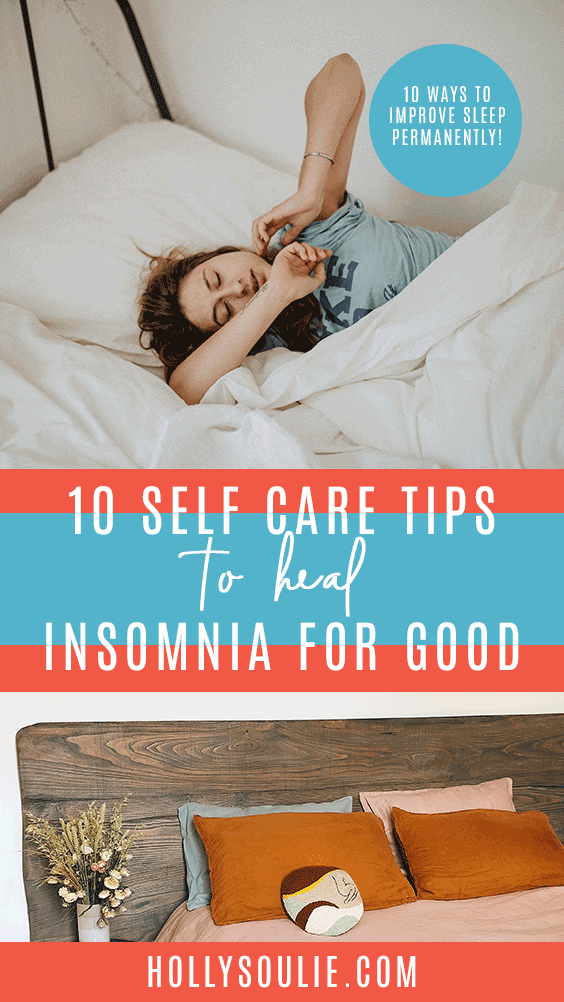
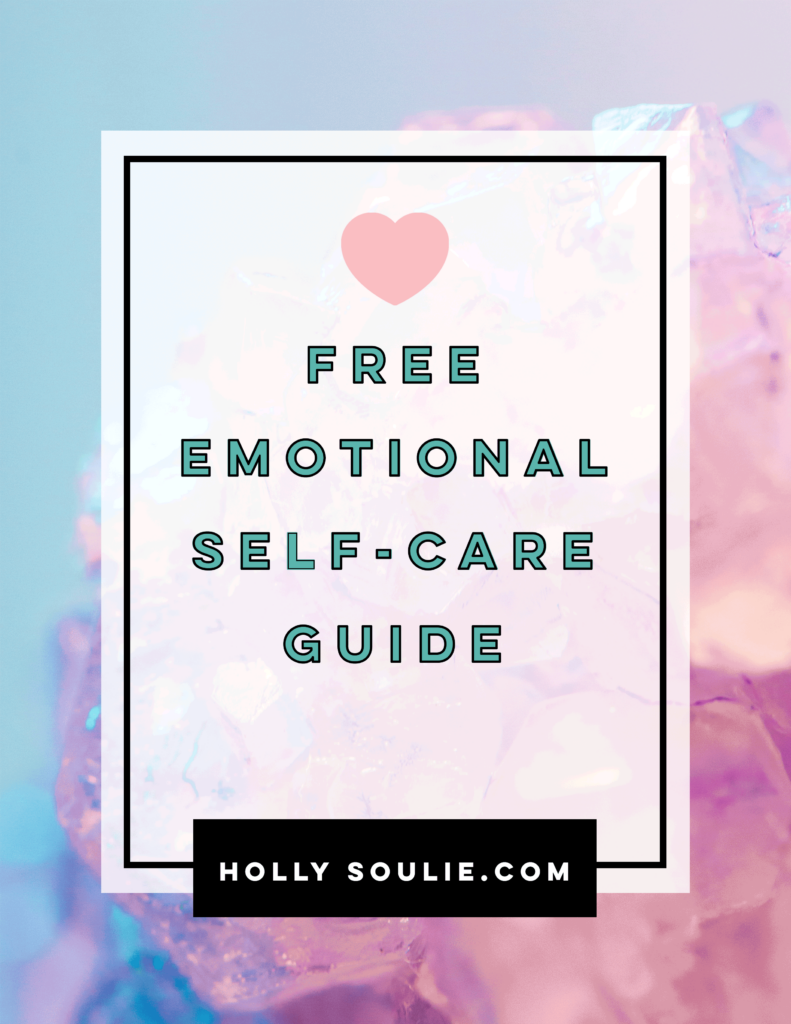
This post may contain affiliate links. Click here to read my disclosure.
I’m an emotional fluency educator, guiding you into a more harmonious relationship with your emotions so you can move through life with clarity and calm.
